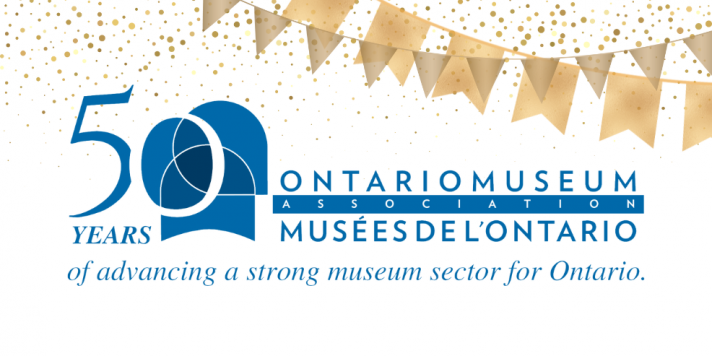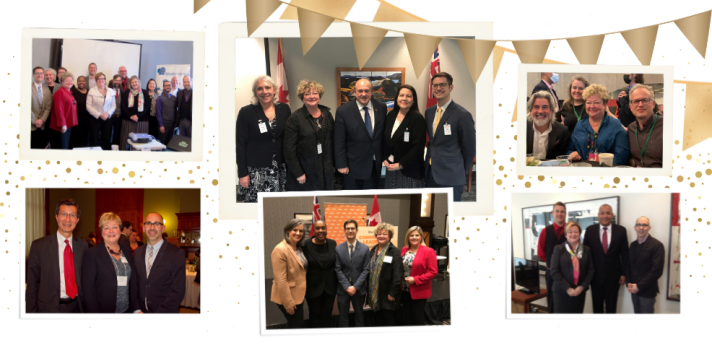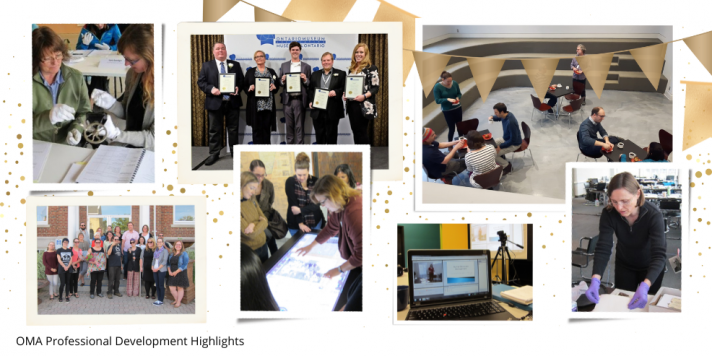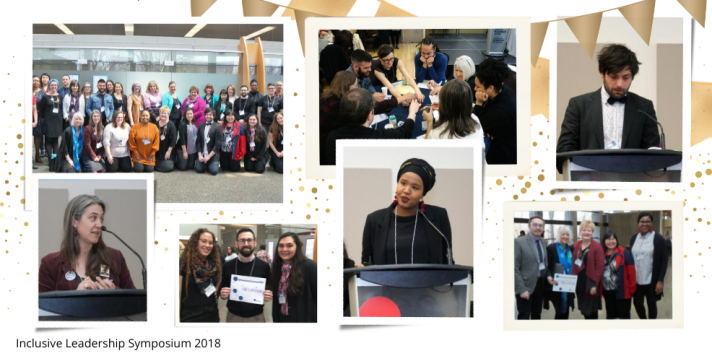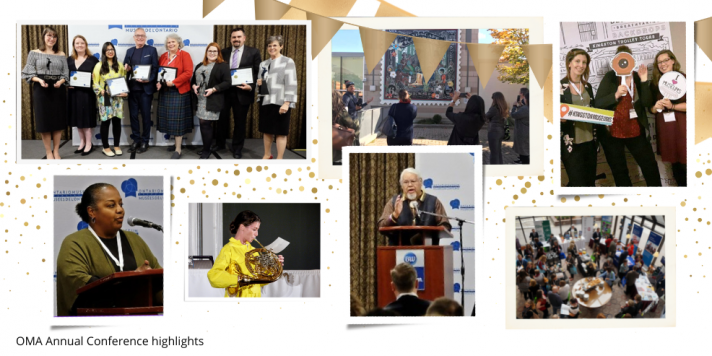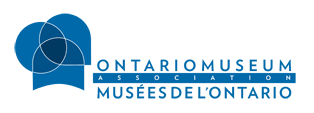For the past 50 years, the OMA has advocated for the vital role of Ontario's museums to society, promoted emerging best practices through professional development, strengthened a collaborative network of Ontario museums, and fostered a culture of innovation and excellence. Its members have shaped and embraced the nature of museum work in service of their communities.
The OMA fulfills its mandate through our ongoing roles as an advocate, convenor, professional body and thought leader. Throughout our Anniversary year, we will feature highlights from past projects, initiatives and events. |
|
As advocates, we provide leadership on key and developing areas of importance to museums. We work with all levels of government, funders, cultural leaders and the general public to strengthen awareness of shared values and support for museums. Initiatives like Ontario Museums at Queen’s Park create great opportunities for members to speak directly with provincial representatives on the valuable contributions of museums to communities as well as their needs and potential. Since 2000, May is Museum Month / Mai, Mois des Musées, celebrates museums across the province and their vital role in communities, while kicking-off the summer tourism season. The #mON400 Musées Ontario Museums initiative (2015-2016), offered the first ever virtual record of francophone heritage in celebration of 400 years of French presence in Ontario.
Over the last 50 years, the OMA has endeavored to strengthen relationships with governments and funders to influence policy that supports museums and results in increased funding. With regular data collection, the Association has been able to present analysis on the Ontario museum for sector improvement. For example, the Community Museums Operating Grant (CMOG) Snapshot publication resulted in doubling of the funding envelope to $5 million.
Additionally, during the pandemic, the OMA carried-out two COVID-19 Impact Surveys to collect up-to-date and sector-specific information on the impacts of COVID-19 on Ontario’s museums. From these surveys, the white paper, Exhibiting Resilience: Empowering Ontario’s community museums for strategic recovery, was published, serving to inform both provincial and federal governments' pandemic support programs, such as: the Ontario Trillium Foundation's Resilient Communities Fund, the $2 million Ontario Digital Capacity fund, and substantial federal government pandemic emergency and reopening funding programs.
The OMA will continue to work with Ontario's Regional Museum Networks (RMN) and the national, provincial and territorial museums associations (NPTMA) on a new National Museums Policy for Canada and the review and renewal of Ontario's museum funding model for all museums serving communities across the province. |
|
| Looking Back: Meetings with government and elected officials |
|
| Photos: (left to right) 1. Clark Bernat (former OMA President, Culture & Museums Manager at Niagara Falls Museums), Marie Lalonde (Executive Director at the OMA), Michael Coteau (Minister of Tourism, Culture and Sport, 2014-2016), and Yves Theoret (former OMA President, Deputy Director at Montreal Museum of Fine Arts), 2. Eleanor McMahon (Minister of Tourism, Culture and Sport, 2016-2018) with OMA Council, 3. Premier Kathleen Wynne and Michael Coteau at Franco-fête, Ontario 400th Celebrations Program 4. The Honourable Pablo Rodriguez (Minister of Canadian Heritage); Jennifer Forsyth (ED/CEO of the Alberta Museums Association), Marie Lalonde and Lynn Saffery (Vice-President or British Columbia Museums Association), 5. Jennifer K. French (MPP), Jill Andrew (MPP), Alexander Gates (former OMA Councillor), Marie Lalonde, and Andrea Horwath (MPP), 6. Cathy Molloy (OMA President), Marie Lalonde, Michael Tibollo (Minister of Tourism, Culture and Sport, 2018-2019), Petal Furness (former OMA President) and Alexander Gates, 7. Michael Chan (Minister of Tourism, Culture and Sport, 2010-2014), Marie Lalonde, and Yves Theoret. |
|
The OMA is a provider of professional development programs that foster continued professionalization of the field. A core component of the OMA’s professional development program is the Certificate in Museum Studies (CMS) - the only museum studies training program in Ontario offered on a part-time basis for museum workers. Launched in 1982 as the Certificate in Basic Museum Studies, the program has more than 400 successful graduates. Additionally, the program is linked to the Standards for Community Museums in Ontario and taught by Course Directors with robust academic backgrounds and extensive experience working in Ontario museums.
The CMS program is reviewed on an ongoing basis to ensure that the program is current, inclusive, comprehensive and accessible. The program will continue to bring together museum workers from across the province and foster collegial relationships and professional networks that endure beyond graduation.
For 50 years, the OMA has continued to recognize museum professionals and cultural leaders who have made outstanding contributions to the Ontario museum community. The Awards of Excellence showcase projects and individuals to encourage high standards of excellence and innovation in the field.
The OMA also advances and provides support for museums in the achievement of best practices, including Standards workshops, symposia on museum education and accessibility, Inclusive Museum Leadership Symposium (2018) and both on Indigenous Collections symposia (2017, 2021).
Special projects like the first edition of RE-ORG: Canada workshop (2014-2015) seek to develop the skills of our museum workforce and share new models of knowledge transfer.
Together with partners, the OMA presented a series of webinars in response to the challenges facing museums during the COVID-19 pandemic (2020-2021). Session topics included how to care for heritage collections, navigating federal support programs, approaches to online engagement and reopening planning. |
|
| Looking Back: Professional Development highlights |
|
| Photos: (Top row, left to right) 1. participants of the Care of Collections course (2013), 2. CMS graduates (2019), 3. participants of the CCI Exhibition Lighting workshop (2019); (bottom row, left to right) 4. CMS Education Programs participants (2016), 5. participants in the CMS Exhibit Planning & Design course (2013), 6. hybrid learning session of the Organization and Management of Museums course (2013), 7. Irene Karsten instructing CCI Emergency and Disaster Preparedness for Cultural Institutions workshop (2017). |
|
As thought leader, the OMA offers inspiring resources and services for the sector, resulting in museums that are recognized locally, nationally and internationally for their work. The OMA seeks to provide professional development, programs and resources that reflect and support best practices and address emerging areas of museum practice, including diversity, equity, accessibility, and inclusion, Indigenous museology, climate justice, and digital transformation.
To ensure Ontario’s museums are continuing to shape and embrace best practices and innovative models of excellence, the OMA has brought together scholars, practitioners, community representatives and museum professionals for conferences and symposia on various topics.
The Colloquium on Learning in Museums (1994, 1997, and 2012) provided participants the opportunity to learn and network with colleagues from across Canada as they shared their work in museum education — later integrating this topic in conference and learning events. In 2012, the Accessibility Symposium–presented in partnership with the the Royal Ontario Museum and the Accessibility Directorate of Ontario–allowed participants to engage with museum colleagues about best practices and innovative programming that meet accessibility standards.
In 2016, the Ontario Museum Association (OMA) and the Looking Ahead Task Force concluded sectoral consultation that led to Ontario’s Museums 2025: Strategic Vision & Action Plan. The publication seeks to reposition museums as powerhouse institutions within Ontario’s cultural sector – institutions that contribute to strong societies and economies based on four overarching goals: Vibrant & Vital Museums, Relevant & Meaningful Collections, Strong & Successful Sector, and Effective & Collaborative Workforce.
In 2018, the OMA launched the Inclusion 2025: A Practitioner's Guide to Inclusive Museums at the Inclusive Museum Leadership Symposium. Through a series of inspired talks, panel discussions and interactive design thinking exercises, the symposium addressed the need to create a diverse and inclusive culture at Ontario museums.
For the OMA Annual Conference 2019 in Brantford, the OMA invited then- ICOM vice-president, Alberto Garlandini, to speak to Ontario museums on the importance of a shared new museum definition and the international efforts to develop the process that considered the numerous impacts of this vital statement of purpose for the global museum community.
In 2017, upon recommendations from the Truth and Reconciliation Commission of Canada Calls to Action, the United Nations Declaration on the Rights of Indigenous Peoples (UNDRIP) and in anticipation of Canada’s Sesquicentennial, the OMA led a discussion about care and interpretation of Indigenous collections. The Indigenous Collections Symposium: Promising Practices, Challenging Issues and Changing the System –presented in partnership with Woodland Cultural Centre, and the Indigenous Knowledge Centre at the Six Nations Polytechnic– served to initiate an ongoing conversation in which the OMA, our members, and Indigenous communities continue to engage. In 2021, the OMA and members of the Indigenous Collections Working Group, presented the Indigenous Collections Symposium: Mashkawatgong-mamawewiziwin – strengthening our bonds, sharing our practices, which focused on putting ideas into practice.
In the critical time of the pandemic, the OMA launched numerous initiatives to support the digital transformation of Ontario museums. One of these is an ongoing collaboration with George Brown College involving faculty and students that will serve to embrace forward thinking and consider new approaches to help envision a museum of the future in a digital world. Other components of the research plan will benchmark how digitalized museums are now, track the impact of digital investment in the museums sector with an Ontario Museum Digitalization Index (OMDI) and test some digitalization toolkits. The research plan also includes getting a better understanding of the museum visitor and how digitalization affects engagements in different segments. All this information will be used to build the business case for increased investment in the museums sector in Ontario.
The OMA has formed a Museum Digital Advisory Committee engaged in these digital initiatives including, the Small Bytes: Supporting Digitization in Ontario’s Smaller and Rural Museums initiative - providing accessible, high-quality online training opportunities to build digital capacity and skills. |
|
| Looking back: Highlights from OMA Symposia |
|
| Photos (clockwise, left to right): 1. attendees at Festival du Loup, #mON400 Musées Ontario Museums (2015), 2-3. participants at the Inclusive Museum Leadership Symposium (2018), 4. Susan Jama at the Inclusive Museum Leadership Symposium (2018), 5. participants from Indigenous Collections Symposium: Promising Practices, Challenging Issues and Changing the System (2017), 6. Temma Pinkofsky, Craig Capacchione and Melissa Phillips, Inclusive Museum Leadership Symposium (2018), 7. Linda Grussani and Stephanie Pangowish, Indigenous Collections Symposium (2017) |
|
As a convenor, the OMA serves as the nexus of a strong network, building a more collaborative, professional and connected sector, through effective communications, and the provision of valuable resources and services. The OMA Annual Conference connects Ontario's museum community, the largest in Canada, bringing together museum professionals, cultural leaders and decision-makers. Recently, in 2021, the OMA held a virtual conference offering the museum sector an opportunity to reconnect with colleagues on the theme of "Reopening, Recovery and Reimagination." Sessions focused on member participation and discussions on a renewed operations funding model, the digital transformation of museums, and how to support a diverse workforce.
In addition, the OMA facilitates sectoral gatherings through various symposia and meetings, including the Indigenous Collections Symposium (2017 and 2021), Inclusive Museum Leadership Symposium (2018), Accessibility Symposium (2012) and Colloquia on Learning in Museums. In 2021, during the persisting challenges of the pandemic, the OMA provided support to Ontario’s museums and museum workers to participate in the province’s reopening and recovery through online webinars, member check-ins and regular e-communications.
The OMA continues to be supportive and responsive to members’ needs through strengthening the province-wide network of Regional Museum Networks (RMNs). Together with the OMA, RMNs work to facilitate communication, consultation and information exchange on issues of common interest, including best practices, advocacy and professional development initiatives.
Additionally, through the museumsuccession project, the OMA saw the formation of the Group of Ontario Emerging Museum Professionals (GOEMP)– an online community to empower, support, and create a network of emerging museum professionals within Ontario’s museum sector. We continue to collaborate with GOEMP to host Ask Me Anything, an online series of webinars, and Conference Connections which both serve to connect emerging museum professionals with highly experienced professionals.
In 2022, the OMA and academic partner George Brown College partnered to facilitate the design charrette, Creating a Vision of Museums in a Digital Future, to explore how digitization can be incorporated into museums in the future. During the creative work session, museum professionals, designers and industry experts came together to collaborate, brainstorm and discuss new ideas about modernization in the museums sector.
The OMA continues to work with fellow National, Provincial, and Territorial Museums Association (NPTMA) colleagues on the new National Museum Policy and its development. Referencing the new international ICOM Museum Definition, the OMA will work with NPTMA's to ensure that the process considers advancing reconciliation with Indigenous Peoples, furthering digital transformation, encouraging equity, diversity and inclusion, and seeking opportunities for improved financial stability for Ontario museums. |
|
| Looking Back: OMA Annual Conference Highlights |
|
Photos (left to right) top: 1. Award of Excellence recipients at Conference 2019, Natalie Wood and Peggy Hause for Brockville Museum, Khadija Aziz, Bill Jeffery, Andrea for Craigleith Heritage Depot, Anna Patterson and Kevin Puddister for Dundas Museum & Archives, and Marty Brent 2. Study-tour participants at Conference 2019, 3. Delegates in the photobooth at Conference 2017 in Kingston
Bottom: 4. Cheryl Blackman speaking at Conference 2019 5. The Vox Aeris Brass Trio at Conference 2018, 6. Rick Hill, Keynote Speaker at Conference 2019, 7. Tradeshow at Conference 2016. |
|
|
